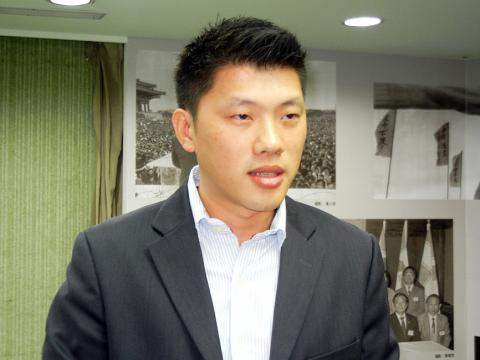Democratic Progressive Party (DPP) Chairman Su Tseng-chang (蘇貞昌) yesterday appointed his long-time aide Lin Hsi-yao (林錫耀) as the party’s secretary-general while also making former representative to the US Joseph Wu (吳釗燮) the head of the DPP’s policy-making body.
The appointments — Su’s first since the former premier took over the party helm on May 27 — also included three deputy secretary-generals: former Pingtung County legislator Lin Yu-shen (林育生), who is close to Su; former Tainan County lawmaker Lee Chun-yi (李俊毅) and former DPP spokesperson Lin Yu-chang (林右昌), DPP spokesperson Wang Min-sheng (王閔生) told a press conference.
A long-time colleague of Su’s, Lin Hsi-yao served for five years as deputy commissioner in Taipei County — now known as New Taipei City (新北市) — when Su was the county commissioner between 1997 and 2004. Lin served as the county’s acting commissioner between 2004 and 2005.

Photo: Lee Hsin-fang, Taipei Times
The decision to appoint Wu as director of the DPP’s Policy Research Committee has raised eyebrows and it appears to reflect Su’s intention to improve ties with Washington, Beijing and pro-independence forces within the DPP.
Wu — now a researcher at National Cheng Chi University’s Institute of International Relations — has wide experience handling cross-strait and Taiwan-US relations during DPP administrations and served as chairman of the Mainland Affairs Council between 2004 and 2007. He was Taiwan’s representative to the US between 2007 and 2008.
Su has also made efforts to divide power among major party factions with the appointments of deputy secretary-generals Lee, who is close to former premier Frank Hsieh (謝長廷) and Yu-chang Lin.
Su has sought to nominate the best possible candidates for the positions, Wang said.
More appointments are expected to be unveiled at the Central Standing Committee meeting tomorrow, Wang said.

DEFENSE: The National Security Bureau promised to expand communication and intelligence cooperation with global partners and enhance its strategic analytical skills China has not only increased military exercises and “gray zone” tactics against Taiwan this year, but also continues to recruit military personnel for espionage, the National Security Bureau (NSB) said yesterday in a report to the Legislative Yuan. The bureau submitted the report ahead of NSB Director-General Tsai Ming-yen’s (蔡明彥) appearance before the Foreign and National Defense Committee today. Last year, the Chinese People’s Liberation Army (PLA) conducted “Joint Sword-2024A and B” military exercises targeting Taiwan and carried out 40 combat readiness patrols, the bureau said. In addition, Chinese military aircraft entered Taiwan’s airspace 3,070 times last year, up about

A magnitude 4.3 earthquake struck eastern Taiwan's Hualien County at 8:31am today, according to the Central Weather Administration (CWA). The epicenter of the temblor was located in Hualien County, about 70.3 kilometers south southwest of Hualien County Hall, at a depth of 23.2km, according to the administration. There were no immediate reports of damage resulting from the quake. The earthquake's intensity, which gauges the actual effect of a temblor, was highest in Taitung County, where it measured 3 on Taiwan's 7-tier intensity scale. The quake also measured an intensity of 2 in Hualien and Nantou counties, the CWA said.

The Overseas Community Affairs Council (OCAC) yesterday announced a fundraising campaign to support survivors of the magnitude 7.7 earthquake that struck Myanmar on March 28, with two prayer events scheduled in Taipei and Taichung later this week. “While initial rescue operations have concluded [in Myanmar], many survivors are now facing increasingly difficult living conditions,” OCAC Minister Hsu Chia-ching (徐佳青) told a news conference in Taipei. The fundraising campaign, which runs through May 31, is focused on supporting the reconstruction of damaged overseas compatriot schools, assisting students from Myanmar in Taiwan, and providing essential items, such as drinking water, food and medical supplies,

New Party Deputy Secretary-General You Chih-pin (游智彬) this morning went to the National Immigration Agency (NIA) to “turn himself in” after being notified that he had failed to provide proof of having renounced his Chinese household registration. He was one of more than 10,000 naturalized Taiwanese citizens from China who were informed by the NIA that their Taiwanese citizenship might be revoked if they fail to provide the proof in three months, people familiar with the matter said. You said he has proof that he had renounced his Chinese household registration and demanded the NIA provide proof that he still had Chinese